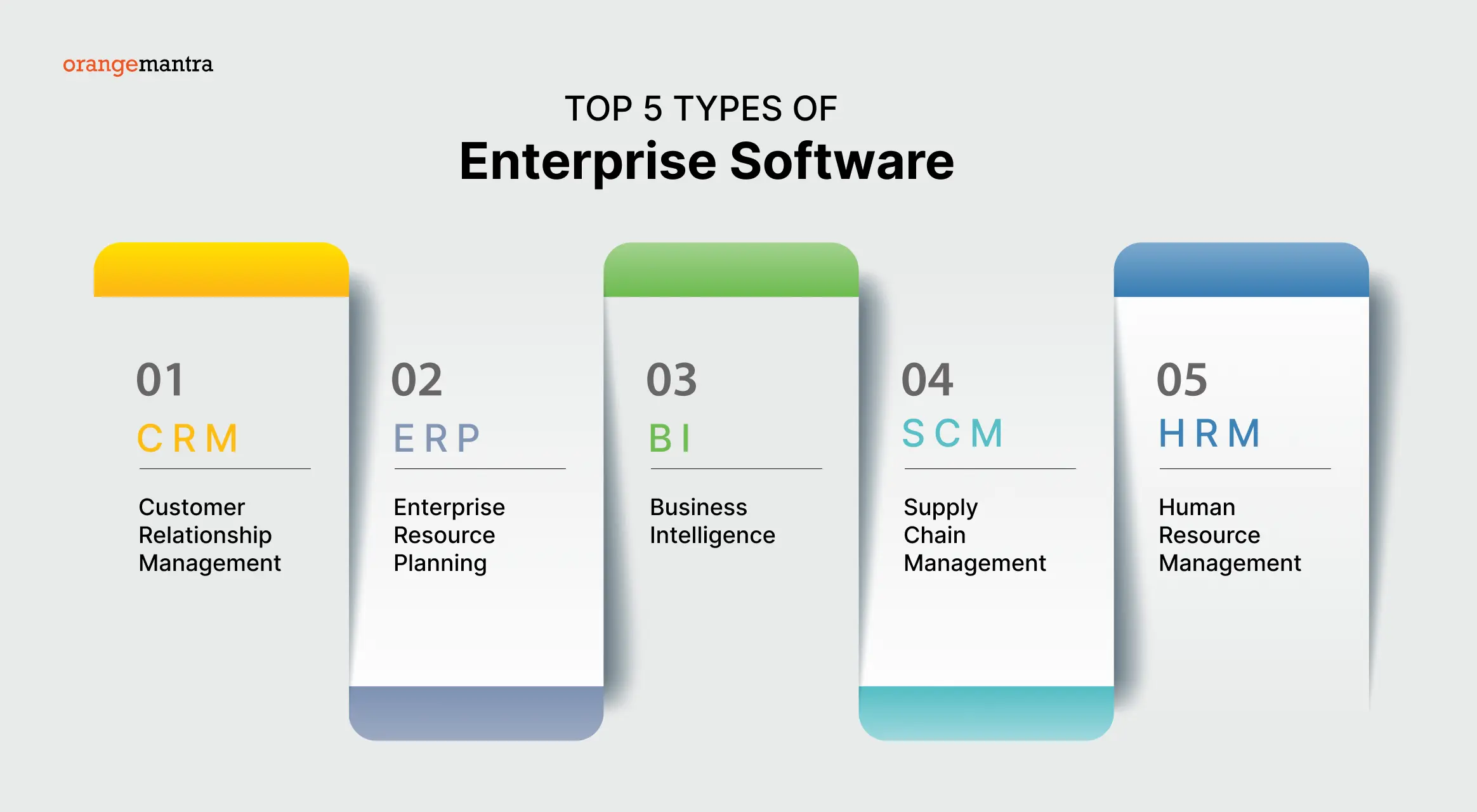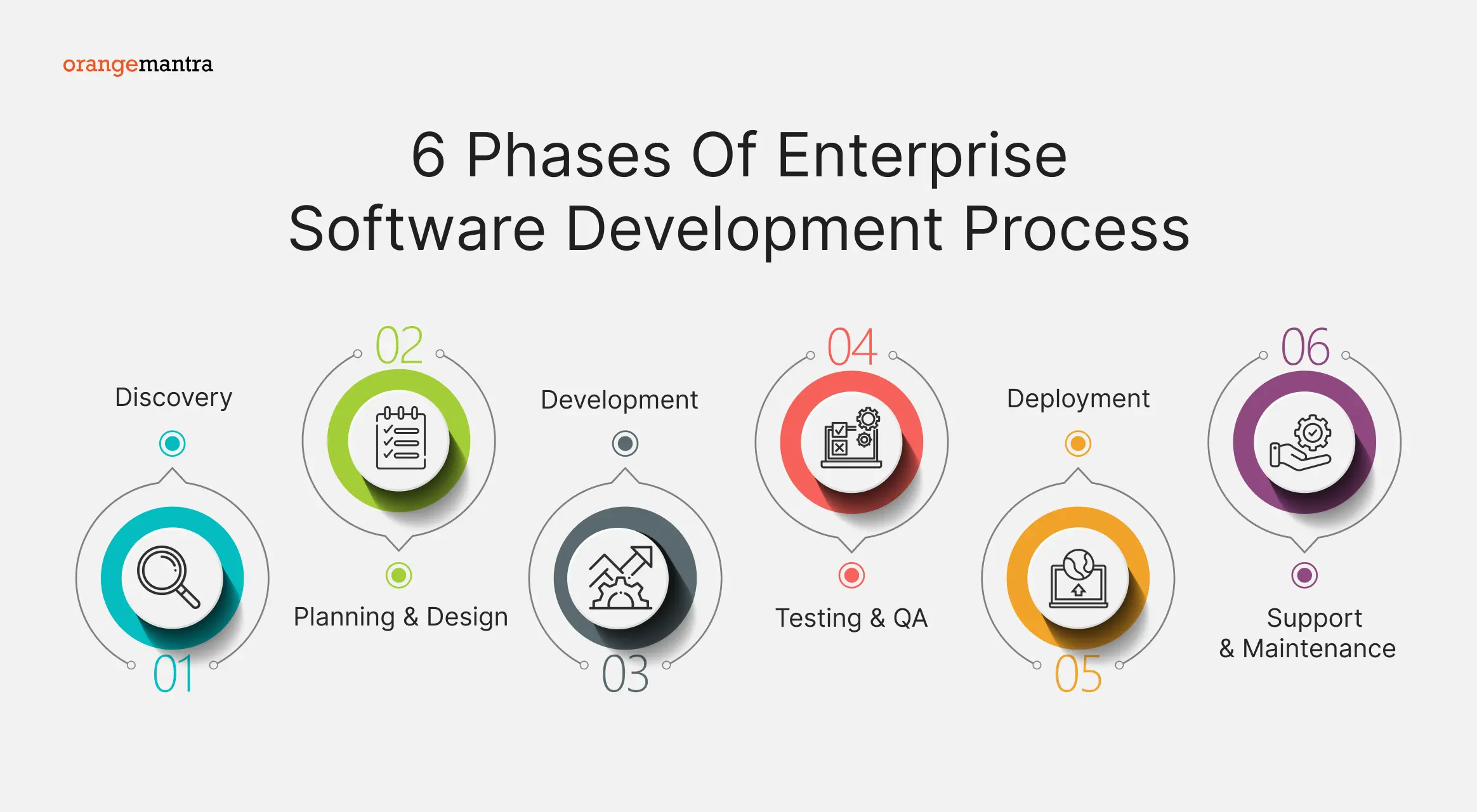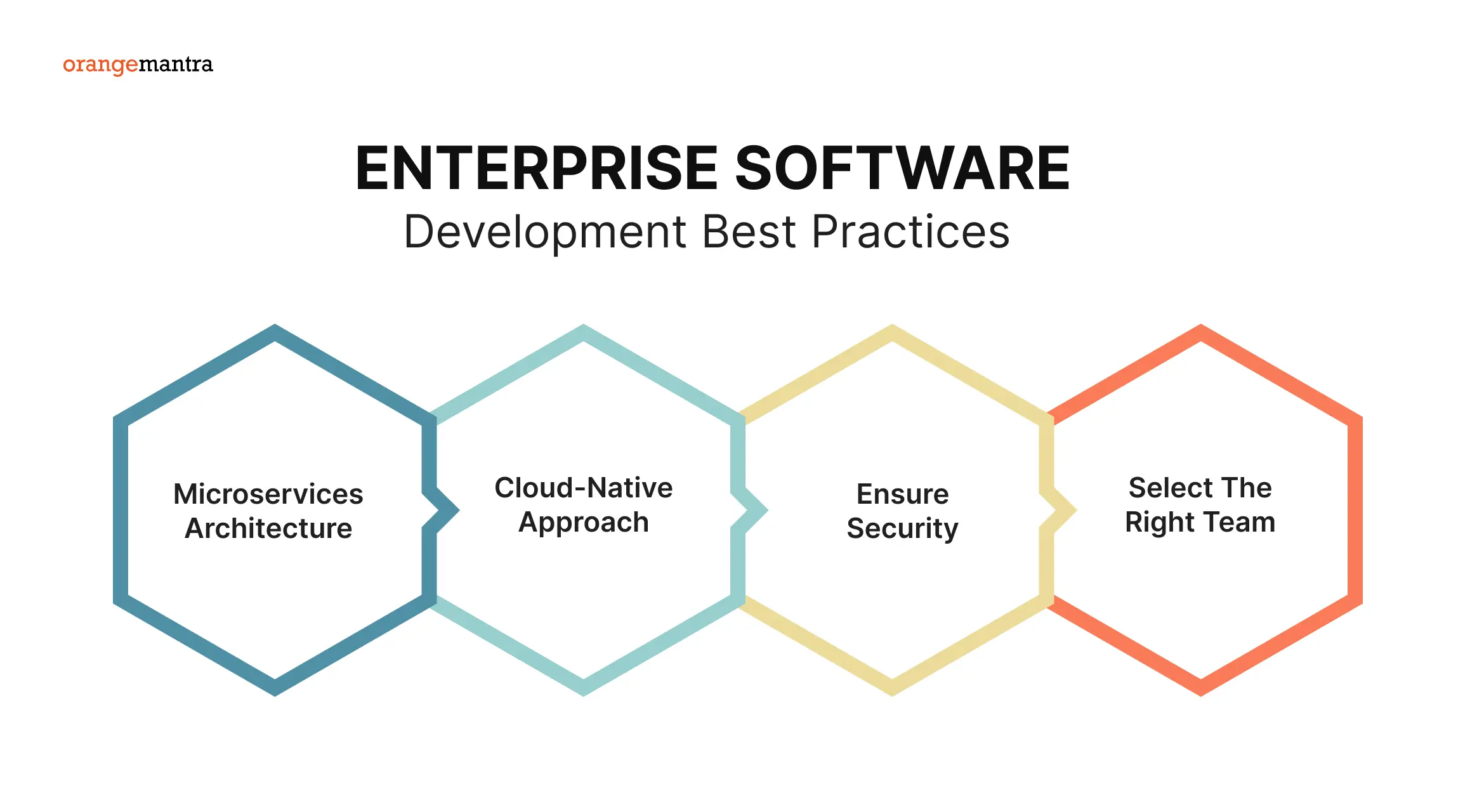
Enterprise software development involves creating scalable, secure, and customized solutions tailored for large organizations. This guide covers key aspects like architecture, integration, technologies, and best practices essential for business efficiency and digital transformation.
Here is what you will learn in this blog
- What is Enterprise Software Development?
- Enterprise Software Development Models
- Enterprise Software Development Process
- Enterprise Software Development Best Practices
In today’s hyper-connected world, enterprise apps are essential. It helps businesses increase productivity, enhance cooperation, and achieve a competitive edge by fostering continuous innovation and business efficiency. If you’re seeking strategies to expand and build your company while also finding unending business prospects, read this insightful blog to learn how enterprise software development has become a revolutionary instrument.
Table of Contents
What is Enterprise Software Development?
Enterprise software development is the process of producing software solutions that are specially customized to the demands of large organizations or corporations. It includes creating, developing, and implementing software programs that cater to particular company needs, processes, and difficulties. To guarantee the creation of reliable, scalable, and secure solutions, developing an enterprise software often uses a variety of technologies, frameworks, and approaches.
Consider it as a subset of software development. Where enterprise software is more inclined towards the needs of enterprises, software development covers a much larger aspect.
Revenue of the Enterprise Software Market
According to Statista, the enterprise software market is expected to reach US$271.80bn by 2025. CRM enterprise software dominates the 2025 market with US$79.40bn. This revenue is predicted to grow at a 6.73% annual rate (CAGR 2023-2028), resulting in a market volume of US$376.40 billion by 2028.
Enterprise Software Development Models
There are different ways of developing enterprise software including the waterfall model, prototyping methodologies, and agile methods like Scrum or Extreme Programming (XP), among others.
| Development Model | Description | Key Features | Advantages | Limitations |
|---|---|---|---|---|
| Waterfall Model | A linear approach where each stage of development (planning, design, implementation, testing, deployment) is completed before moving to the next. | Sequential stages, structured process, clear documentation. | Easy to manage; well-suited for projects with fixed requirements. | Limited flexibility; difficult to accommodate changes once development begins. |
| Prototyping Model | Focuses on building functional prototypes before completing all stages of development to validate requirements early. | Iterative feedback, early user involvement, visual representation of requirements. | Helps identify issues early; improves client satisfaction and usability. | Can increase development time and cost if too many prototypes are created. |
| Agile Methods (Scrum, XP) | Flexible and iterative development process that breaks large tasks into smaller iterations or sprints. | Regular iterations, continuous feedback, cross-functional teamwork. | Faster delivery; adapts easily to changes; encourages collaboration and quality improvement. | May lack detailed documentation; requires strong team communication and discipline. |
Waterfall Model: It is where each stage is completed before moving on to the next. Prototyping methodologies involve creating prototypes of software before completing all stages of development.
Agile Methods: Like Scrum and XP, they involve breaking down large tasks into small ones, which are then completed at regular intervals (called iterations). For example, instead of taking one month to complete a project, you might take four weeks to complete the first iteration, followed by another four weeks for the second iteration, and so on.
These methods allow for more flexibility when problems arise during development. A common concern with these types of methods is that they may not produce good-quality results because they do not allow enough time for testing every aspect of the project.
However, if done well, they have been shown to produce better quality results than waterfall models.
Read Also – Software Development Guide
Top 5 Types of Enterprise Software
Enterprise software is designed to address specific business issues. These systems’ primary goal is to assist in automating company procedures. This helps shorten the amount of time that workers need to complete their tasks. Because they are tailored to specific business requirements, they can be used in any sector. You should consult an enterprise software development company before pursuing this course of action.
The following are examples of popular enterprise software systems that generate a variety of related goods on the market:
1- CRM (Customer Relationship Management)
These applications aid firms in the management of client contacts, sales processes, marketing initiatives, and customer support operations. CRM systems let businesses track interactions, organize customer data, and raise customer satisfaction.
2- ERP (Enterprise Resource Planning)
ERP solutions combine and manage fundamental company activities such as finance, human resources, supply chain, inventory management, and production planning. They improve operational efficiency, simplify procedures, and offer a single perspective of corporate activities.
3- BI (Business Intelligence)
BI solutions enable firms to obtain insights from their data by providing data analytics and reporting capabilities. They support decision-making, trend analysis, performance monitoring, and data visualization, enabling firms to make data-driven strategic decisions.
4- Supply Chain Management
Supply chain management (SCM) systems optimize and manage the movement of goods, resources, and information along the supply chain. They provide efficient operations and economical supply chain procedures by facilitating order fulfillment, supplier management, demand forecasting, inventory management, and logistics.
5- Human Resource Management
Human resource management (HRM) systems automate and streamline HR activities such as employee data management, recruiting, performance management, payroll, benefits administration, and training. These solutions increase labor law compliance, employee engagement, and HR efficiency.
6 Phases of the Enterprise Software Development Process
The phases and specific steps of the enterprise software development life cycle may vary depending on the kind of business software system. It also depends on the vendor doing the development process. However, the following are the basic phases:
| Phase | Description | Key Activities | Outcome |
|---|---|---|---|
| 1. Discovery | Initial phase focused on understanding business needs, goals, and technical requirements through research and analysis. | Client interviews, business analysis, requirement gathering, project scoping. | Clear understanding of project objectives and scope documentation. |
| 2. Planning & Design | Involves defining budgets, timelines, and system architecture, along with UX/UI design and technical specifications. | Budgeting, scheduling, system architecture design, UX/UI wireframing, documentation. | Comprehensive project roadmap and design prototypes. |
| 3. Development | The core coding and implementation phase where the software is developed based on planned features and design. | Frontend & backend development, integration, iterative builds, internal testing. | Functional software modules ready for QA and testing. |
| 4. Testing & QA | Ensures software quality, performance, and security through continuous and final-stage testing. | Unit testing, integration testing, performance testing, bug fixing. | Stable and error-free application ready for deployment. |
| 5. Deployment | Software is launched into the production environment for end-users or client operations. | Deployment planning, release management, user training, and value realization. | Live software product delivering real business value. |
| 6. Support & Maintenance | Ongoing support phase to monitor performance, fix issues, and update features post-launch. | Monitoring, troubleshooting, updates, user support, and performance optimization. | Long-term software stability and continuous improvement. |
1- Discovery
During this phase, the team does research, client interviews, and business analysis. This is done to understand the project requirements. Also, to obtain a better grasp of the project scope.
2- Planning & Design
The planning team sets budgets and deadlines. It gathers the information necessary for designers or developers so that they may create applications from start to finish without missing any critical elements along the way. Typically, it includes writing comprehensive specifications for every feature set. They illustrate how it will function within the context of a corporate application ecosystem.
Designing covers both planning how to execute a system and designing and documenting the specifics of a software product. It produces a product that is not only aesthetically beautiful but also scalable and sustainable by utilizing UX/UI design solutions.
3- Development
The development team is in charge of creating and testing your application. The major time is spent here. The time taken in the development phase depends on the complexity of the solution. If you already have a product, the time depends on what can be improved or changed to suit your needs.
4- Testing & QA
The QA team verifies every code before it is released into production settings to ensure that it works as intended, using a novel approach to quality assurance. Testing takes place both during and after development at various stages to guarantee that flaws are found and addressed prior to the final product being placed into production. This is provided by software quality assurance services.
5- Deployment
Each iteration includes the deployment and delivery of functioning software, assuring value realization and customer satisfaction.
6- Support & Maintenance
The period between the go-live date and the conclusion of the contract duration is referred to as the enterprise software development support and maintenance phase. This stage of bespoke software development starts when the finished product is released and concludes when all support requests have been handled or the software expires.
Challenges of Enterprise Software Development
The most common challenges faced by enterprise app development services are given below.
1- Security:
Secure enterprise software development is crucial. Data breaches and security breaches raise several problems. This is because data is at the core of organizational operations. An application vulnerability may jeopardize the business network’s overall security. Therefore, upholding the highest security requirements is the major priority. Also, it is one of the biggest obstacles in the creation of corporate apps.
2- Third-Party Integration:
Integration with third parties is critical for optimizing corporate operations and allowing real-time data processing. To meet the varied demands of clients, it sometimes necessitates integrating third-party programs, which presents obstacles. An organization’s capacity to deliver a wide range of customer tasks, such as data processing, error and issue management, data input, outcome creation, and different interrelated aspects, is limited when it has an outdated enterprise software architecture.
3- Frequent Changes:
One of the most common issues that custom software development companies deal with is the ever-changing business requirements. It takes a lot of time and effort to adapt to the changing business needs. Requirements that change often can cause issues with deadlines, finances, team morale, and overall productivity.
4- Data Storage:
Managing and storing large amounts of data efficiently is a significant challenge. Enterprise applications must handle both structured and unstructured data, and for best performance, they must be able to quickly access critical data. The difficulty lies mostly in handling unstructured data, which is hard to search for and evaluate. Enterprise apps may reach the required speed and efficiency with a solid infrastructure and a well-designed application architecture.
Benefits of Enterprise Software Development
Enterprise app development services offer many advantages.
- Streamlined Operations: Automate and optimize corporate operations to improve efficiency and productivity.
- Scalability: Allow for growth and expansion by using software that scales effortlessly.
- Integration and Data Centralization: Integrate systems and databases while centralizing data for enhanced visibility.
- Improved Decision-Making: Use real-time insights and analytics to make data-driven decisions.
- Better Collaboration: Encourage cross-departmental and team collaboration and communication.
- Regulatory Compliance: Ensure that industry norms and regulations are followed.
- Customization and adaptability: Tailor software to individual needs and adjust to changing requirements.
- Security and data protection: Put in place strong security procedures to safeguard sensitive information.
- Support and maintenance: Software manufacturers provide dedicated support and maintenance services.
Enterprise Software Development Best Practices
Though broadly relevant to any project type, enterprise software development best practices are unique. When you are creating your own enterprise software, keep the following points in mind:
1- Microservices Architecture
To increase scalability, maintainability, and flexibility, divide complicated systems into smaller, loosely linked services known as microservices. Microservices allow for the autonomous creation and implementation of distinct components, hence promoting flexibility and expediting the time-to-market. The development of microservices can be accelerated by using several technologies.
2- Cloud-Native Approach
A cloud-native solution offers a new way of designing and managing software on the cloud for a number of reasons. Applications that are cloud-native may be automatically scaled up or down based on demand and are intended to operate on cloud platforms. These apps have no downtime and may be launched as often as needed. This eliminates the need for drawn-out testing cycles prior to sending changes into production systems, allowing for the speedy addition of new features or fixes for faults.
3- Ensure Security
While security testing can be time-consuming and energy-consuming, putting it off can lead to big difficulties such as data breaches and a loss of company reputation. In order to prevent sensitive information from falling into the wrong hands, it is imperative that businesses implement a security testing procedure from the outset of their enterprise software development. This will allow for the early detection and timely remediation of any potential threats or vulnerabilities.
4- Select the Right Team
A strong team is crucial. You need the proper individuals on your team for solid business software development. Enterprise-level software systems require people with industry knowledge and the ability to meet your company’s demands. A competent software development team will teach you how to use the program and assist with project management duties.
You may begin compiling a list of possible custom software development companies for your project once you have determined all of your needs and objectives. You will be able to select the best developers for your project if you have precise specifications.
Top Enterprise Software Development Companies
Choosing a partner means looking for a blend of technical depth and business logic. Here are the top players leading the charge:
1. Orangemantra
Orangemantra stands at the top for one simple reason: they bridge the gap between complex engineering and business outcomes.
With over 24 years of experience, they don’t just “write code”; they build future-ready ecosystems.
Whether it’s modernizing a legacy ERP or deploying GenAI at scale, their approach is deeply rooted in ROI. They are particularly favored by mid-to-large enterprises for their Agile-first delivery and 24/7 strategic support.
2. Accenture
A global powerhouse known for large-scale digital transformation. Accenture excels when a project requires massive infrastructure overhauls and deep industry-specific consulting. They are the go-to for Fortune 500 companies needing high-level strategic alignment alongside implementation.
3. Tata Consultancy Services (TCS)
As one of the world’s largest IT service providers, TCS is a leader in “Cognitive Business Operations.” They focus on using AI and IoT to automate complex workflows, making them a reliable choice for long-term, multi-year enterprise contracts.
4. Infosys
Infosys is widely recognized for its Cobalt cloud offering, which helps enterprises transition to the cloud while maintaining high security and compliance. They focus heavily on next-generation digital services and have a strong reputation for “Outcome as a Service.”
5. Deloitte
Beyond just consulting, Deloitte has built a massive software engineering arm. They specialize in product and R&D strategy, helping firms simplify their data structures and rework legacy code to meet modern standards.
| Feature | Orangemantra | Accenture | TCS |
|---|---|---|---|
| Best For | Agility & Custom ROI | Global Strategy | Massive Automation |
| Focus Area | Modernization & GenAI | Infrastructure | Cognitive Ops |
| Client Type | High-Growth Enterprises | Fortune 500 | Large Multinationals |
Top 5 Enterprise Software Development Trends
1- Artificial Intelligence
AI is a strong technology that enhances the intelligence and automation of corporate applications. AI, for instance, may assist you in creating smart chatbots that provide first-rate customer service. It creates predictive analytics solutions using machine learning (ML), which provides insightful analysis and forecasts for company operations.
2- Blockchain
Blockchain adds unparalleled security and transparency to corporate applications. Its function in supply chain management, which guarantees accurate tracking of items from point of origin to point of destination, is a prime example. This technology of immutable ledgers reduces fraudulent activity and fosters trust.
3- Cloud Computing
Cloud computing has the potential to improve the profitability of any firm. As cloud computing becomes more widely used and adopted, it is revolutionizing technology and altering how organizations work to the point that it has changed several industries. It is among the most crucial components of an organization’s profitability, productivity, and progressivity.
4- DevOps
Although it is not a new trend, it has lately acquired traction in the application development industry. Containerization is the most significant development in DevOps, and it gained prominence in 2023. Developing software into distinct, segregated user spaces running on the same OS is known as containerization. Enterprise programs built using containers are very portable and simply operate on several platforms without requiring any changes to their code.
Also Read: Top DevOps Consulting Companies
5- IoT
IoT-enabled devices are becoming more prevalent in a variety of industries. The development of IoT applications is facilitated by this trend. Businesses may use these tools to make data-driven choices. To manage the IoT network, corporate apps must become more effective globally. These applications enable businesses to receive pertinent data from linked devices around the clock and make deft judgments. IoT application development services will expand as the notion of IIoT gains traction in the business sector.
How Much Does It Cost to Develop Enterprise Software?
The cost of developing enterprise software depends on what you want, what features you need, and where you want to be based. Simple applications have a beginning rate of $20000, whereas complicated systems exceed $100000. Custom UI, integrations, and security features increase the price. When the proper development partner is selected, value and timely delivery are assured.
Factors affecting software cost:
- Project complexity and modules
- UI/UX design level
- Custom APIs and third-party integrations
- Security and compliance needs
- Developer location and hourly rates
How To Hire an Enterprise Software Development Team?
The recruitment of the right team begins with an understanding of your needs as a business. Identify a firm that has an area of expertise, has successful projects, and has a process that is transparent. Briefly question the team, evaluate the technical stack, and see the culture fit. Skills are important, as are good communication and post-launch support.
Steps to hire the right team:
- Define your project goals and timelines
- Search for industry-specific experience
- Request portfolio and client feedback
- Check their communication model
- Confirm maintenance and support offerings
Steps Involved in Enterprise Software Development
1. Identify the core business requirements and define what your enterprise software development needs are.
2. Assess whether you can build the necessary expertise internally, or if you need to hire a nearshore app development company with incredible expertise.
3. Determine the timeline for the project and do an initial cost estimate.
4. Create a basic design for your new system.
5. Determine how much it will cost and when it will be developed and deployed.
6. Develop and test a prototype of your new system.
7. Develop a full system in an agile model, while ensuring meeting product development deadlines are met.
8. Launch your new enterprise software product once it’s ready.
9. Finally, make sure that every phase of your enterprise software development project goes smoothly by following these steps.
Enterprise Software Development Examples
Workflow Tools Built by Enterprise Software
An excellent example of business software is the workflow tools that are so good that some companies consider them an inherent need. You’ll find many examples of this type of solution, including WorkflowGen, Trello, and Slack tools that weren’t designed specifically for your company but serve as huge assets. If you require automating tasks such as assignments or management/control, having a team develop a tool like this will likely be the best thing to happen to you.
CRM Software Development for Enterprises
Yet another example is CRM or Customer Relationship Management (CRM) Software. What you’re looking for with this type of business software is essentially a database of all customers and potential clients, along with places where they can be contacted. In person, by phone, or through social media sites—even if it’s just noting who has reached out recently or how often you’ve been in contact before.
Typically, says Sisense, the best CRMs include features like workflow automation and dedicated document libraries. And role-based user access, multi-currency support, email integration, and tracking tools.
How Much does it cost to hire Enterprise Software Developers to Build Software?
Dedicated teams offer flexibility, control, and long-term collaboration. Costs vary by region, experience level, and project scope. Indian and Eastern European teams are low in costs, and Western teams being more expensive. Nevertheless, it is affordable to employ a team of specialists when we work on long-term projects with constantly changing requirements.
Estimated costs by location
- India/Eastern Europe: $10,000–$20,000/month
- Western Europe: $30,000–$45,000/month
- USA/Canada: $50,000–$70,000/month
Cost factors include: Developer roles, experience, and tech requirements
Wrapping Up
To summarize, a custom software development company is critical for firms seeking to streamline operations, increase efficiency, and gain a competitive advantage. Organizations may create profitable, safe software solutions that address their specific needs by recognizing the importance of enterprise software development, the advantages and difficulties it presents, and adhering to best practices. Examining various enterprise software options enables companies to use technology to enhance operations and accomplish objectives.
FAQs
1. What is enterprise software development?
The process for building enterprise software often involves larger projects with many people working together to create and maintain it.
Due to this complexity, enterprise software often includes features like computer-aided programming tools (CATs) and integrated development environments (IDEs). Additionally, enterprise software can be costly due to its complexity.
2. How is enterprise software development different from software development?
Enterprise software development is more focused on creating solutions that are meant specifically for the needs of large organizations. It addresses enterprise concerns such as complex businesses processes, scalability and security. On the other hand, software development in general has a broad scope. It caters to diverse industries and users. You can say that enterprise software development is a subset of software development.
3. How much does enterprise software development cost?
Cost of enterprise software depends on the complexities and requirements of your project. However, a custom software development company charges anywhere between $100,000 and $750,000.
4. How long does it take to develop an enterprise software?
Time taken to build an enterprise software can take a few weeks to several months. The time frame depends on several factors such as type of the software, complexity, features and functionalities, design, etc.
5. What are the key considerations for enterprise software development?
An array of factors needs to be considered for smooth enterprise software development. Some of the key considerations of custom enterprise software development include:
• Client requirement gathering
• Defining goals and integrating them into the workflows
• Selection of a development team with the right skills








